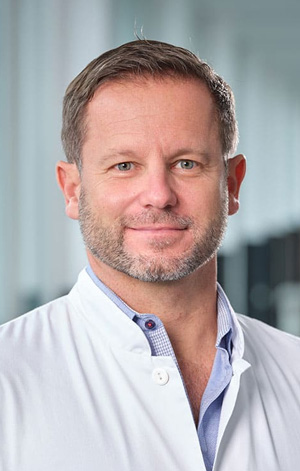Degenerative spine diseases
Herniated disc of the cervical, thoracic, or lumbar spine
Signs of wear of the intervertebral discs, the cartilaginous shock absorbers between the vertebrae, appear after the age of 20. Repeated unilateral and unnatural stresses and incorrect posture exacerbate the situation. In most people with a healthy back healthy, MRI will reveal wear of the intervertebral discs. However, this usually has no clinical significance. Approximately 5% of all people will suffer from a herniated disc. Through the formation of cracks in the outer fibrous ring, soft disc material extravasates towards the spinal canal and nerve roots and can exert pressure on these.
Special techniques implemented at our centre
Cervical spine
Using a frontal incision, the disc is removed. Either a place holder (titanium or plastic cage) or a prosthetic disc is inserted. The relief of the pinched nerves usually relives the symptoms immediately. The risk of nerve or spinal cord injury is minimal (well below 1%). If a small herniated disc is in a lateral position, it can also be removed from behind. In our centre this Fryckholm surgery is performed in a minimally invasive manner with minimal muscular injury. In this technique, the cervical spine is reached using a 10-mm-long incision and dilation technique. The herniated disc is removed through a narrow working channel with the help of an endoscope. Because of the very small incision and minimal stress on the muscles, post-operative pain is considerably reduced.
Thoracic spine
Because of the anatomical conditions in the area of the thoracic spine (extension of the spinal cord with narrowness of the spinal canal) intervention in this area is relatively complex compared with other spinal surgeries. At our centre, these procedures are performed using continuous neuromonitoring.
Lumbar spine
At our clinic, operations on the lumbar spine are performed using purely endoscopic or endoscopically-assisted methods. These techniques allow us to find the gentlest access to the pathologically altered structures and protect the supportive elements of the spinal column (muscles, ligaments, intervertebral joints). Because of the very small incision and minimal stress on the muscles, there is minimal loss of blood. The postoperative pain is significantly lower. The patient is able to stand up on the day of surgery and can be discharged within a short time.
In the case of extensive degenerative disc disease, prosthetic discs may also be used in certain situations. In the case of symptomatic segmental instability (spondylolisthesis), vertebral stiffeners (spondylosis) may be necessary in certain conditions. At our clinic, these interventions can be performed using intra-operative CT examinations.
By using endoscopic and endoscope-assisted technique, the surgical access to the spinal column can be created carefully, thereby preserving the muscles. This promises minimal operation-related injury and a quick recovery after surgery.
Lumbar spinal stenosis
The natural ageing of the spine, which is aggravated by incorrect posture as well as non-physiological and repetitive stress, can lead to the degeneration of various elements of the spine. Intervertebral discs, intervertebral joints, and ligaments display wear. This can eventually narrow the spinal canal and/or the exit points of the nerve roots. Occasionally, this narrowing is further complicated by spondylolisthesis.
Elderly patients (over 60) are typically affected. Women are more susceptible than men.
Special techniques implemented at our centre
The goal of any surgery is the expansion of the narrowed segment and/or the constricted nerve window. Various techniques are used for this purpose. These include interspinous decompression, recessus decompression, unilateral fenestration with undercutting to the opposite side, and bilateral fenestration. The optimal method depends on the special peculiarity of the disease and is determined on an individual basis. At our clinic, all operations are performed in a microsurgical, endoscopically-assisted manner. The ultimate goal is the protection of all supporting and stabilizing elements of the spine.
At our centre, we often use intra-operative myelography and computed tomography. After creation of an incision, the spinal canal is punctured before decompression. Iodinated contrast agents are then injected. With the help of lateral fluoroscopy and CT, the constriction can be precisely depicted. After surgery, the CT is repeated. The wound is closed only after the spinal canal has been completely decompressed.
